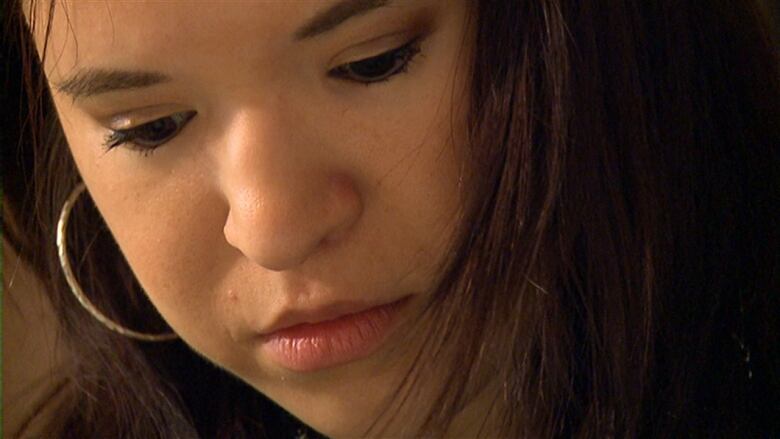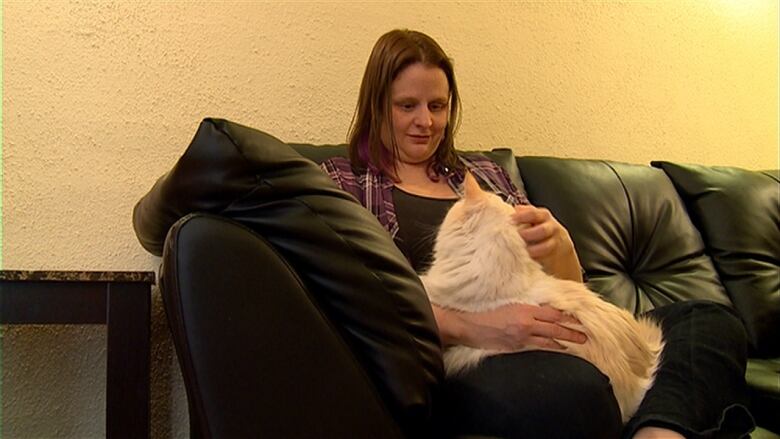Discharged: Mental health patients raise alarms about care in Winnipeg
New task force started two weeks ago to look at discharge and privacy policies
Two Winnipeg women are speaking out afterbeing discharged from Winnipeg hospitals during mental health crises, in light of Reid Bricker's disappearance.

"I can't believe I'm still living and that I don't have any brain damage," she told CBC News. "I feel like the mental health system has failed me."
Herstory is eerilysimilar toBricker the Winnipeg man whodisappeared following his releasefrom a Winnipeg hospital in Oct.2015where he was under care for attempting suicide, hours before.
Siddle, asmiley, soft-spoken, university graduate lives with anxiety, depression and borderline personality disorder the same host of mental health issues Bricker battled.
She has tried to end her life so many timesat least 10 she's admittedly beginning to lose count.

Discharged from multiple ERs
Siddle's first brush with a Winnipeg ERcame at age 20 after deliberately overdosing on pills. Her sister found her unconscious in her North Kildonan bedroom and her mother rushed her to ConcordiaHospital.
"I don't think I even stayed there a whole night. I was released, maybe the next morning. I don't remember the doctors saying 'Do you feel suicidal? Do you need more help?,"' she said.
I don't remember the doctors saying, 'do you feel suicidal? Do you need more help?'- Stephanie Siddle
"That was the first time I got the piece of paper full of resources like the crisis lineand stuff like that, but when you're in that state you don't feel like calling for help. So it didn't really help at all."
"I left my house and went to someone else's house so I could go away silently...I didn't want anyone to find me."
A day later she woke up, and out of fear of what she'd done, she said she took herself to Concordia.
"I saw a doctor but I was gone, I think, the next day. I went back home and pretended everything was normal," she said."It was hell because I was still really depressed."
In 2013,she visited Winnipeg'sCrisis Response Centre, only to be sent home after a few hours with another load of pamphlets, she said.
"A doctor who was really over confident came in, and he was young and he said 'Well, you're 26 you should really just get over it, it's time to grow up now,' so I left there and I never wanted to asked for help ever again," she said.
In June of 2015, Siddle said she was assessed and released from St. Boniface Hospital in a cab in the middle of the night hours after arriving for trying to take her own life, similar to Reid Bricker.
A few weeks later, Siddle would make what her family calls the most serious attempt. She was recovered by strangers, in the AssiniboineRiver under the Osborne Street bridge.
After this incident, Siddlewas able to securea spotin a residential treatment centre where she said she is finally getting the help she's needed all along.
"The mental health system needs to be more available to people...When someone does try to commit suicide we need to find them help right away. We should get people to get help before they leave the hospital that they have a plan that they have a therapist to go to that's free, that they have maybe groups just more stuff in line."
After six months in residential treatment,Siddlesaid she nowhas hope for the future. She hopes to use her psychology degree to help others. She also hasa place of her ownand a partner, she said.

Dischargedat 1 a.m. with bus ticket
Stephanie Chartrand, said she too has been released from a Winnipeg hospital overnight in a vulnerable mental state.
The 32-year-old who lives with severe depression and anxiety was brought to theHealth Sciences Centre by police, during a psychotic episode in August 2014.
"I was brought into the hospital and for what I believe was 24 hours I did not sleep, I did not eat, I did not pee, I just sat there, talked to some psychiatrists, doctors," she said, adding she eventually fell asleep and when she woke up a fewhours later andwas told she was free to go.
They told me straight upthey needed the room for someone else.- Stephanie Chartrand
"They told me straight up they needed the room for someone else," she said, adding there was no follow-up plan and she was given a bus ticket.
It was 1:00 a.m. and she said she had no keys to her apartment, no cell phoneandwas given a bus ticket, despite the fact buses were not running. She didn't know at first, that her mom was there to take her home.
"It feels like people with mental health problems don't matter. They just wait for us to have a moment of clarity and that's when they ship you off. And it's frustrating."
When Chartrand learned of Reid Bricker'sovernightdischarge, she identified immediately.
"That could have been me," she said. "If I wasn't lucky enough to have someone with me I would never have made it home that night. There should be plans in place that...for any human being that comes in involuntarily there has to be follow up in place."
Since the episode, Chartrand said her mental health has kept her from holding a job and she said she hasbeen unable to obtain a psychiatrist.
Task force looking at changes: WRHA
Dr. Murray Enns, medical director of mental health services for the Winnipeg Regional Health Authority (WRHA) said not everyone in a mental health crisis can or should be admitted to hospital.
"Obviously, it's a specific resource and it has it's place," he said.
"But, it's not the answer for everyone presenting [with a mental health issue]."
Ennssaid roughly12,000 people visit emergency departments or Winnipeg's Crisis Response Centre each year with mental health concerns.
Only 2,400 are admitted to hospital, he said.
Still, Ennsacknowledges the serious risks that come with mental health crises.
"People areat risk for self-harm.They're at risk for completed suicide and we offer services to try and get people help to reduce that risk," he said.
"But,the nature of the person's mental illness typically is not something that is cured in hospital."
An emergency physician and various mental health teams make "clinical judgments" about discharging patients within hours of their arrival with mental health concerns, Enns said.
The team does not release patients that are not competent to make their own decisions.
"If a person is having a psychotic illness and isn't intouch with reality, that person will not likely be able to reason about their health care decisions," he said.
"Somebody right after a suicide attempt might be quite competent; quiteconnected, alert, oriented, very well-aware of their circumstances."
Ennssaid every patient who presents with a mental health issue is seen by an emergency doctor, who may call on apsychiatry team if necessary.
Upon release, patients areequipped with an individualized plan for follow-up care, and arrangements are made for transportation and notifying a loved one if they choose.
Discharge procedures are under review in light of Reid Bricker's disappearance.
The WRHA's CEO Milton Sussmanis chairing a task force to examine potential changesthat could be madeto improve them.
The task force will look at an array of items including how personal health information is used and shared, as well as potentially modifying discharge protocols for mental health services, said Enns.
Money for mental health at 'bottom' of budget
Chris Summerville who heads the Schizophrenia Society of Manitoba saidlack of funding and staffcontinue to be the main factors holding back mental health services in Manitoba.
Summerville said four per centof the province's total health care budget goes toward mental health services.
"That means that we're at the bottom of the health care budget," he said, adding with one in five people struggling with mental health, it should be a higher priority. "The Mental Health Commission of Canada says that our funding should be up to at least 12 per cent."
In light of Reid Bricker's disappearance, the provincehas committed to looking at discharge protocols and health privacy legislation to try and improve services. Summerville saiduntil this becomes a louder public issues, services will continue to suffer.
"The public has to advocate and lobby and scream loud on this," he said. "Mental health has to be a major issue and that will get the attention of the politicians.
"The cry is getting louder but it's not as a loud as it should because unfortunately you're dealing with public social prejudice and stigma."














_(720p).jpg)


 OFFICIAL HD MUSIC VIDEO.jpg)
.jpg)



























































































